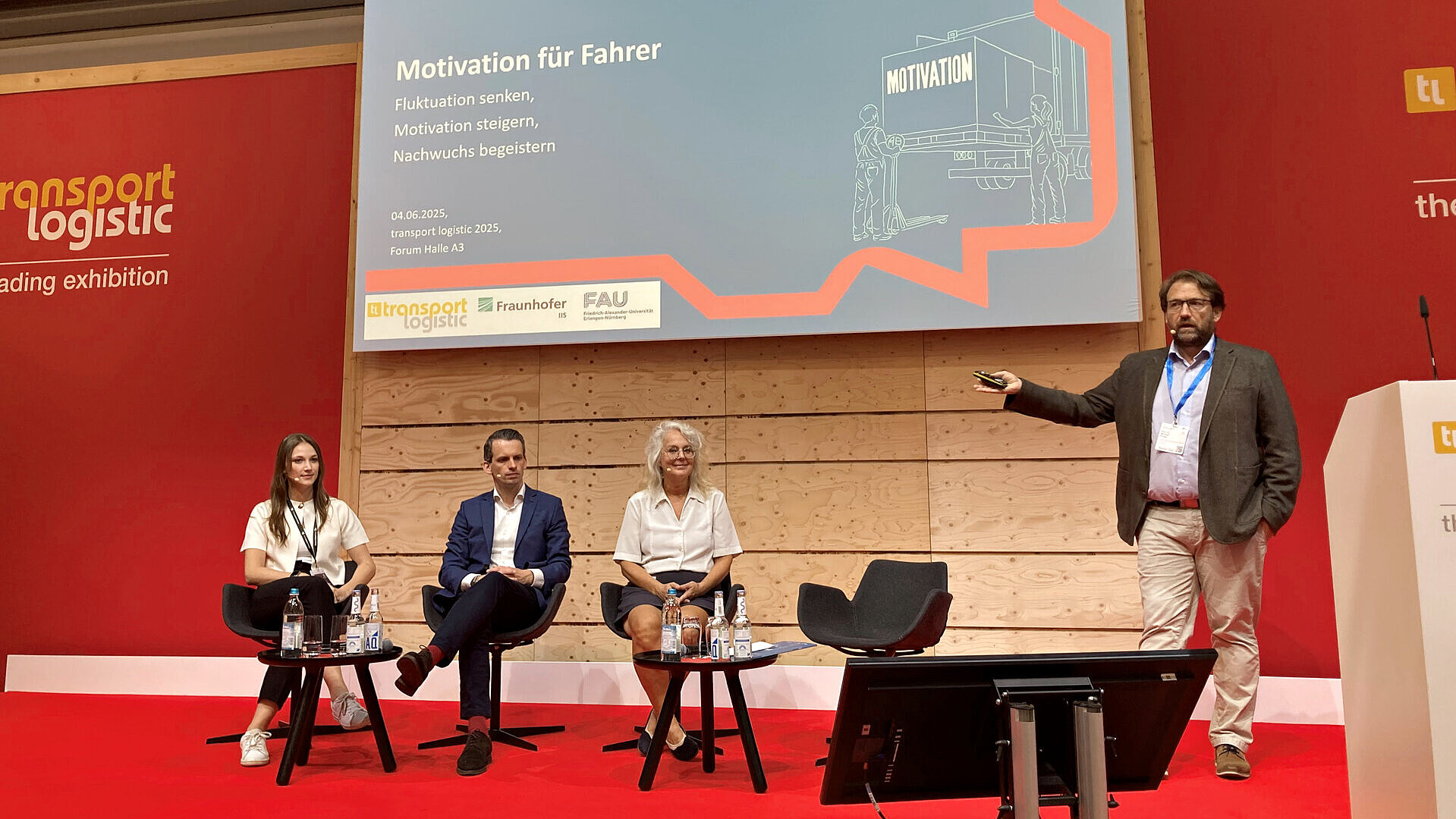
More motivation behind the wheel

Truck drivers are the backbone of local transport logistics – yet their working conditions are rarely the focus of strategic improvements. This could turn the driver shortage into a serious problem for the growth of the entire German economy. There is currently a shortage of around 70,000 drivers – and the trend is rising. Countermeasures are therefore urgently needed.
In the LeitFahr³ research project, which will run from 2022 to 2024, the everyday working lives of truck drivers in local transport have been analyzed in detail to identify stress factors and motivating elements, reported Nicole Lubecki-Weschke, research assistant in the Supply Chain Services department at the Fraunhofer Institute for Integrated Circuit Technology IIS, during the panel discussion ‘Motivation for drivers – reducing turnover, increasing motivation, inspiring young talent’ on Wednesday.
Based on interviews with drivers, dispatchers, and HR managers, a comprehensive ‘driver journey’ was created – from hiring to retirement. The study identified 275 stress factors and 180 positive influencing factors, with many of the stress factors attributable to internal company processes. This finding offers companies the opportunity to increase the motivation and satisfaction of their drivers through targeted measures such as improved communication, structured processes, and reliable equipment.
The results were summarized in a practical catalog of measures that offers companies concrete recommendations for improving working conditions. Five key guidelines for practice were identified that can sustainably strengthen the motivation, satisfaction, and loyalty of drivers, reported Michael Krupp, Professor of Logistics and Supply Chain Management at Augsburg University of Applied Sciences.
The focus is on better communication and involvement. Drivers don't just want to receive instructions; they want to feel like they are part of the company. People who receive regular information, are actively involved, and know their development prospects are more motivated.
Equally important is reliable, structured process organization—both within the company and at the interfaces with customers, ramps, or partners. Unclear responsibilities, long waiting times, and poorly coordinated processes in particular cause frustration and time pressure. Digital communication must also function smoothly. However, there is often a lack of functioning IT infrastructure – for example, when mobile devices are defective, there is no data connection, or systems are not user-friendly. Such shortcomings make everyday work more difficult and increase stress.
Another factor that hinders motivation is the inadequate equipment of vehicles. At the same time, the demands on modern equipment are increasing. And those who drive with outdated technology on a permanent basis experience this as a lack of appreciation. Last but not least, transport preparation has a significant influence on the quality of everyday work. Incomplete delivery documents, missing information about unloading points, or unclear ramp situations lead to unnecessary hectic situations and an increased likelihood of errors.
The study makes it clear that many stress factors for drivers are not driver-related, but rather lie in the process and system responsibilities of the companies. By targeting these areas, companies can not only increase satisfaction, but also improve efficiency and customer service.
Even though Ansorge Logistik does not currently have a shortage of drivers, but rather a waiting list that is processed as new vehicles become available, managing partner Benedikt Roßmann attaches great importance to the satisfaction of his drivers. For example, the company holds small information events about twice a year, where management, HR, and representatives from the workshop and fleet are available to answer drivers' questions, and also provides an external contact person for tax and social security issues.
Four employees now work in fleet management, two of whom speak the native language of foreign colleagues, and dispatching also takes individual wishes such as shift times or preferred vehicle brands into account to minimize stress factors.
Driver qualifications such as the CE driver's license and BKF modules are managed centrally and offered in in-house training courses, enabling Ansorge to actively control processes and reduce the workload for drivers. With regard to loading, the company relies on pre-loading points, which means that drivers do not have to load themselves, and also values them through modern truck equipment and driver-friendly services such as rest areas at e-charging parks. ‘It's not one measure that counts, but the balance,’ emphasizes Roßmann. ‘Drivers are a scarce and valuable resource and should be treated as such.’
Andreas Schmied Logistik motivates its drivers by involving them directly in decision-making processes, for example through regular meetings with management and driver representatives as spokespersons, reported Lina Jahn, HR Manager at Andreas Schmid Logistik. Modern trucks, air conditioning, and spacious cabins noticeably improve everyday working life. Free snacks every Thursday create a sense of community and strengthen team spirit. Individual requests regarding shift times or vehicle preferences are taken into account as far as possible to show appreciation. In addition, internal trainers promote targeted further training, and multilingual ‘cab news’ keep all employees informed at all times.
Jahn’s assessment of the measures could also motivate other companies: ‘We haven't moved mountains, but it's often the little things that make our employees really happy. Individual measures can have a big impact.’ (cb)



